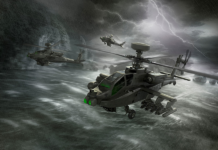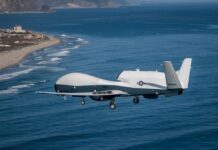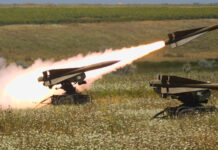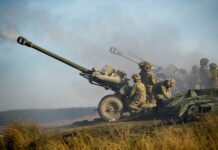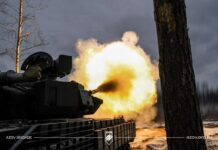As the war in Ukraine enters its third year, access to the Black Sea for both sides has remained deeply strategically relevant. As the battle for control continues, neither side can afford to surrender control of this vital area.
A stalemate and renewed sense of urgency
As Russia’s ongoing invasion of Ukraine seems to become a more entrenched facet of the European security landscape, forces on both sides are increasingly faced with the potential of a stalemate. The Ukrainian counteroffensive could slow down even further in the near future, according to Michael Kofman, military analyst at the Center for Naval Analyses (CNA).[1] The difficulty of conducting modern warfare at this scale was proved already by the Russians during the first stages of the war, in absence of any comparable defensive line. Even enthusiastic Western commentators have recently labelled Russian defence systems in Ukraine as “formidable”.[2]
Whether these efforts have, in fact, been formidable remains up for discussion. The invasion of Ukraine has shown that loitering munitions, drones, and hybrid warfare are able to create a stalemate through a preventive formation of sufficient fighting mass. This has also been echoed by Commander-in-Chief of Ukraine’s Armed Forces, Valerii Zaluzhnyi, who recently conceded that, as in World War I, the level of technology on either side precludes prospects for a ‘deep and beautiful breakthrough.’[3]
The alleged slowing down of the Ukrainian counteroffensive, in conjunction with limited active Armed Forces of the Russian Federation (AFRF) defence along the Kupyansk-Svatove-Kreminna line near Avdiivka,[4] have the potential to postpone a Ukrainian victory. From an alliance politics perspective, the counteroffensive was instrumental for showing Western partners that their economic and military commitments were worthwhile.

Credit: Giangiuseppe Pili, Roman Kolodii, and Jack Crawford
The limited successes of the counteroffensive, when coupled with the uncertainty around Ukrainian casualty rates[5] and President Zelensky’s internal struggles against corruption,[6] however, have all aligned with (and potentially contributed to) wavering support from the West compared to the first months of the invasion.[7] US support was already on rockier ground[8] before, as claimed by Zelensky, Western attention returned to the Middle East.[9] The EU is grappling with its own internal struggles, such as Poland’s response to the diversion of Ukrainian grain through mainland Europe instead of maritime export routes.[10] Other European countries have also threatened to suspend aid in response to the diversion as well.[11] This setback is due to Russia’s weaponisation of Ukraine’s grain exports, echoing Stalin’s utilisation of grain and hunger as political instruments.[12]
However, the stability required for any renewed Russian efforts may be in question. Recently, Vladimir Putin appeared on Chinese media declaring that he wants a different world order, dissimilar from the one envisioned by “countries with colonial legacies”.[13] Internally, this translated into a series of repressive actions, such as sentencing artists,[14] monitoring academics connected to foreign institutions,[15] banning the “international LGBT movement”,[16] and sacking a Natural Resources Ministry Official on grounds of corruption.[17] The dubious death of Yevgeny Prigozhin and other Wagner Group associates also sent ripples through domestic channels otherwise supportive of the war.[18] More recently, a former Russian Air Force Commander, Vladimir Sviridov, and his wife were found dead without explanation. Reassuringly, the Federal Security Service (FSB) officers are investigating.[19] These repressive tactics are familiar staples of Russian autocratic measures dating back to at least the 1930s.
It is difficult to say whether these are symptoms of a greater problem, although it is worth recalling how frequently despotic emperors have been deposed by their Praetorian Guards. All of these measures, however, do coincide with the Russian population’s digestion of the current situation on the ground in Ukraine; as of late May 2023, roughly 47,000 Russian men under the age of 50 died in the war, and this is according to conservative estimates.[20] As the military analyst Anders Puck Nielsen pointed out,[21] this is already more than three times the number of the total casualties the Soviet Union (with 260 million inhabitants as of 1979) experienced during the ten years war in Afghanistan (which means roughly 1,500 dead per year in Afghanistan, as opposed to at least approximately 30,000 per year in this war) – a war which has often been claimed to be one of the major reasons for the Soviet Union’s economic and political collapse.[22]

Credit: Giangiuseppe Pili, Roman Kolodii, and Jack Crawford
As the Ukrainian dream of a quick ousting of Russia’s invasion further fades into preparations for a longer conflict, time is of the essence for both sides, before factors beyond the battlefield begin to erode momentum. Therefore, it makes sense that Kyiv and Moscow will expand their scopes beyond the arena of land warfare to see where other gains might be made. One such arena—the Black Sea—has already seen its fair share of action, but may very well become a revisited point of priority in the next phases of the conflict.
Russia’s initial maritime attacks on Ukraine’s coastline, including the infamous encounter at Snake Island and its most recent retreat from the Black Sea Grain Initiative, show how maritime logistics have remained a crucial strategic facet of the war. The land warfare aspects of the invasion have created the conditions for a war of attrition, which requires a whole-of-society commitment to sustain supply lines, infrastructure and production capacity. World War I ended on the eastern front, in part, because of a lack of resources that ultimately led to revolution and capitulation. In Russia’s approach to its invasion, maritime logistics have proved equally pivotal, as evidenced by recent events in the Black Sea.[23]
The strategic importance of the Black Sea
The strategic importance of the Black Sea lies primarily in its logistical value for Russia. The AFRF rely heavily on railroads and specialised brigades, such as the Material Technical Support brigades, for maintaining supply chains.[24] However, these landbound brigades face challenges in meeting the demands required for sustained invasion efforts, such as capacity for physically transporting military goods.
Enter the role of maritime logistics. Large cargo vessels are an easy remedy the difficulty of moving large quantities of supplies over land.[25] With Russia’s closest ports to Ukraine being in the Black Sea, uninhibited access to these ports is essential for Russia’s military operations and heavily incentivises Russia to maintain a strategic advantage at sea.[26]
This value has not been lost on the Kremlin. Russia has already used its Black Sea power to impose a blockade against Odessa, Ukraine’s major port and primary hub for its grain exports.[27] Russia’s Navy continuously targets grain depots in Odesa to eliminate Ukraine’s economic prowess,[28] having allegedly destroyed at least 300,000 tons of grain.[29] Additionally, Russia’s presence in the Black Sea provides the AFRF with a strategic vantage point for launching missile attacks.[30] The Black Sea is also a major Russian hub for exporting oil[31] and other critical goods.
As a result, it is no surprise that Russia would go to great lengths to maintain its operations through the Black Sea, even by using a fleet of ‘special ships’ that violate international maritime law to procure military goods from abroad.
The SPARTA IV: A case study in Russia’s prioritisation of Black Sea logistics
This fleet is owned by the sanctioned Oboronlogistics LLC, a company owned by the Russian MoD and connected to the Chief Directorate for Troop Accommodations JSC,[32] which shares close ties to Russian oligarch Timur Vadimovich Ivanov, deputy Ministry of Defense and close ally of Putin.[33]
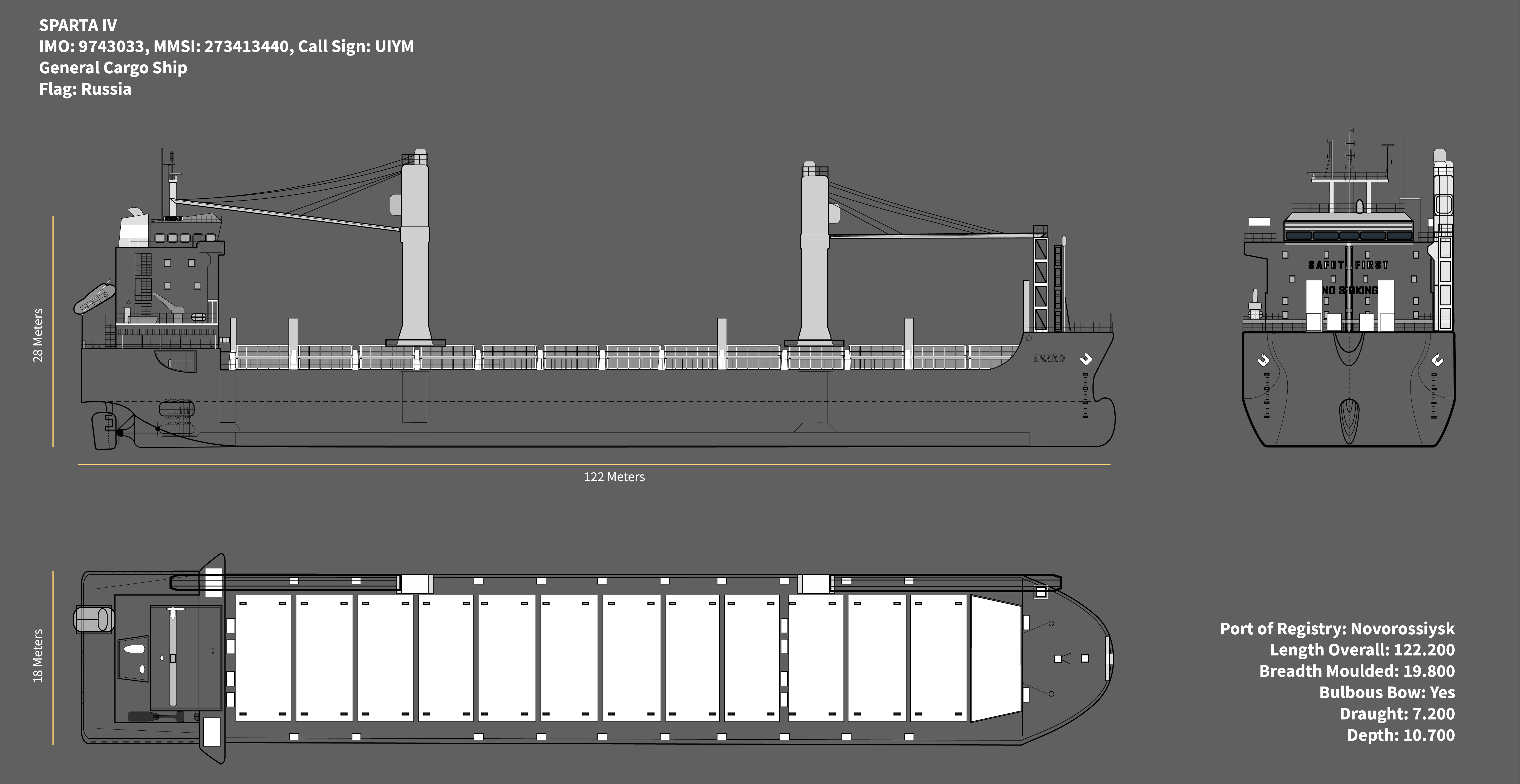
Credit: Giangiuseppe Pili
This fleet includes ships including the SPARTA II, PIZMA and SPARTA IV that appear to transport Russian military equipment from Syria to Novorossiysk, one of Russia’s main Black Sea ports.[34] According to the Center of Strategic and International Studies (CSIS), the SPARTA IV specifically even moved howitzers and other artillery pieces.[35] Throughout 2023, these ships appeared to frequently ferry military goods to and from the Middle East, while Putin made his interests clear through renewed arms purchases with Iran, and senior-level meetings with Iranian and Hamas leaders.[36]
Oboronlogistics’ fleet is not stopped in the Bosporus because of the grey legal area in which they play,[37] and they prove Ukrainian efforts insufficient. On 28 February 2022, just four days after the beginning of the invasion, Turkey closed the Bosporus to all military vessels.[38] However, Turkey’s decision to do this was no small action, as the Montreux Convention holds Turkey accountable if the country appears to misuse this ability.[39] The Montreux Convention defines the preconditions necessary for Turkey to restrict movement through the Bosporus, the restrictions Turkey may impose on vessels if these preconditions are met, and the limits of Turkey’s ability to impose restrictions.[40]
Turkey may only restrict freedom of navigation through the Bosporus if it is a belligerent, it perceives to be threatened, or has legal obligation to aid a belligerent. It can only restrict warships and auxiliary vessels, and it must still permit daytime passage to these vessels when they are formally stationed in the Black Sea, so long as the passage is announced in advance by the vessels. Turkey cannot restrict commercial vessels, and it is not guaranteed the right to check the cargo of ships transiting the Bosporus.
This is the loophole Russia uses. By operating assets such as the SPARTA IV as commercial vessels, the ships are not beholden to the same ones applied by Turkey to military ships. However, an investigation conducted by the team (with other analysts converging in the assessment)[41] revealed that these ships are actually possibly equivalent to auxiliary vessels transporting military materiel through the Bosporus.[42]
Despite the ability of these ships to enter and exit the Black Sea freely, Ukraine appears to have paid close attention to these vessels. Since the Ukrainian Navy lost all its limited capability in the very early days of the war, Ukraine seems to have pivoted to guerrilla war, employing asymmetric tactics and capabilities wherever possible.
In the summer of 2023, Ukraine even used unmanned surface vessels (USVs) to target the SPARTA IV’s alleged military escort on one voyage, and changes in behaviour of the Russian vessels (such as diversions in sailing routes and the obfuscation of AIS tracking signals) indicates that the fleet was cautious to avoid detection or confrontation.[43] Reliance on unmanned platforms at sea, however, is a different business than doing so on land. While the use of USVs is as old as World War I, a persistent difficulty in their use is the inability employ them at a distance,[44] making destroyers and military escorts reliable assets in the meantime.
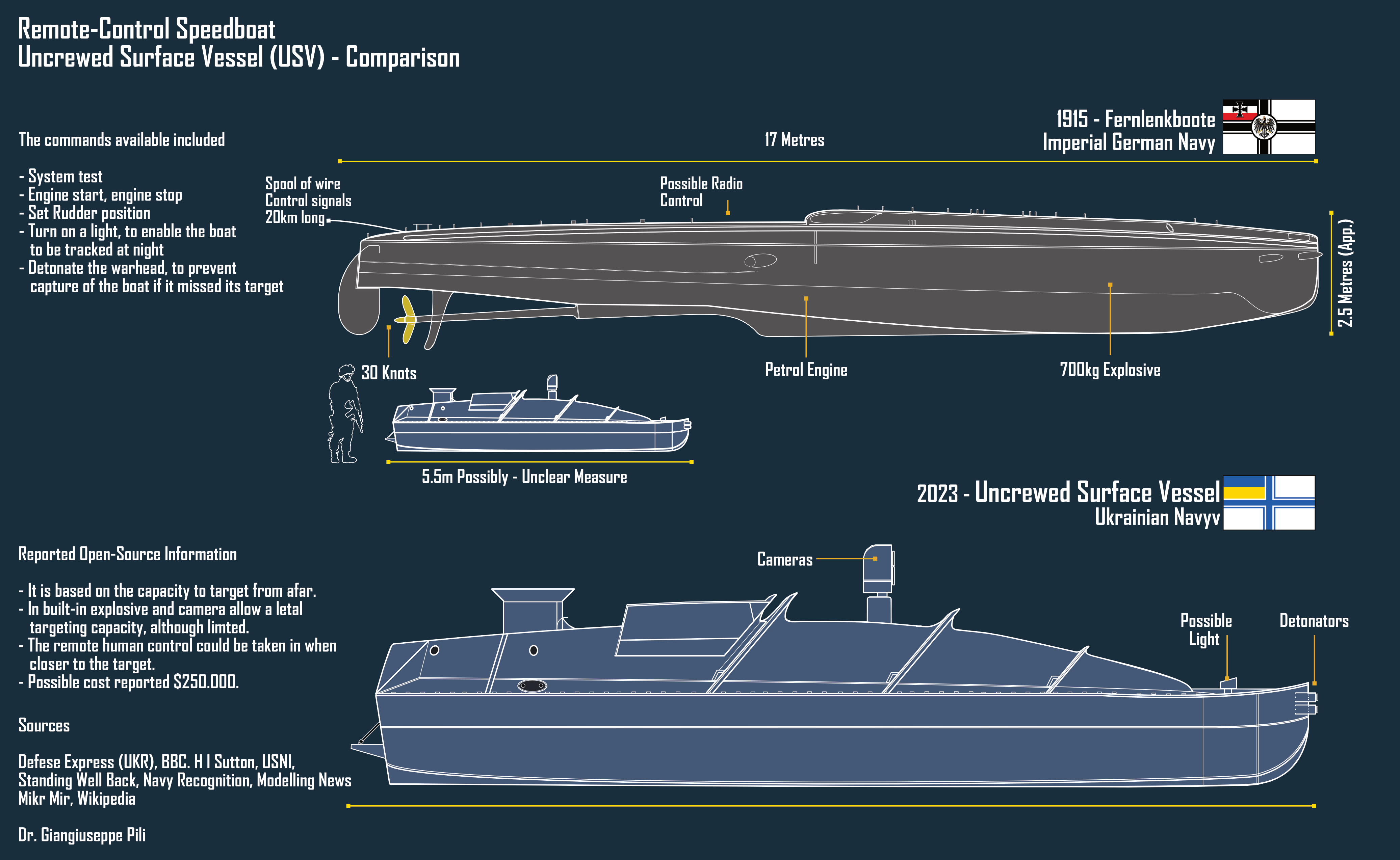
Credit: Dr. Giangiuseppe Pili
As a result, Russian military capability currently provides sufficient protection to allow Oboronlogistics’ fleet to avoid both international law and USVs at the same time. Moreover, the Russian navy, though suffering maritime losses unmatched in the West since World War II (including the loss of the Moskva Project 1164 Atlant guided-missile cruiser and the Rostov-on-Don Project 636.3 Improved Kilo-class submarine – an historical achievement in itself)[45] was nonetheless able to hamper the Black Sea corridor, where Ukrainian civilian cargo vessels were trying to resist the Russian pressure over the movement of grain, to the point of halting it.[46]
However, as the Vietnamese and guerrilla fighters in Algeria knew very well, the reality is that nobody likes guerrilla warfare. In the 1975 film ‘The Battle of Algiers’, when being questioned by a French journalist on the practice of planting explosives in baskets, the fictional Algerian guerrilla leader Ben M’Hidi replies: “Obviously, planes would make things easier for us. Give us your bombers, monsieur, and you can have our baskets.” As declared by sources in Russia, the war in 2024 could renew the Russian attempt to take over the coast and Odessa. Ukraine and its allies must be prepared – losing the battle for the Black Sea is simply not an option.
Dr Giangiuseppe Pili, Jack Crawford, Nick Loxton, and Roman Kolodii
Author Box:
Dr. Giangiuseppe Pili is an Assistant Professor at the Intelligence Analysis Program, James Madison University and he is an Associate Fellow with the Open-Source Intelligence and Analysis research group at RUSI.
Jack Crawford is a Research Analyst with the Open Source Intelligence and Analysis research group at RUSI.
Nick Loxton is Head of Intelligence Delivery at Geollect. Nick is an ex-British Army officer, having served nearly nine years with The Rifles.
Roman Kolodii is a PhD candidate from Charles University (Czechia). Roman is an expert in international security with a special focus on the Russo-Chinese cooperation on science, technology, and military affairs.
[1] Michael Kofman And Ryan Evans, “Adaptation At The Front And The Big Picture In Ukraine,” War on the Rocks, 11-2023, available at: https://warontherocks.com/2023/11/adaptation-at-the-front-and-the-big-picture-in-ukraine/
[2] ‘Why Ukraine Is Struggling to Puncture Russia’s Formidable Defenses’, Wall Street Journal, 07-2023, available at: https://www.wsj.com/video/series/in-depth-features/why-ukraine-is-struggling-to-puncture-russias-formidable-defenses/8ADA4C1F-0418-43CF-B08A-6EBE0A657F3A, where Brigadier Gen. Mark Kimmitt broke down the analysis, see also Holly Ellyatt, ‘Russia’s military has adapted and is now a more formidable enemy for Ukraine, defense analysts say’, CNBC05-2023, available at: https://www.cnbc.com/2023/05/19/russias-military-has-adapted-is-now-a-formidable-enemy-for-ukraine.html
[3] ‘Ukraine’s commander-in-chief on the breakthrough he needs to beat Russia,’ The Economist, Nov 1, 2023, https://www.economist.com/europe/2023/11/01/ukraines-commander-in-chief-on-the-breakthrough-he-needs-to-beat-russia
[4] ISW, ‘Ukrainian and Russian forces continue to conduct offensive operations in eastern and southern Ukraine’, Institute for the Study of War, 11-2023, available at: https://www.understandingwar.org/backgrounder/russian-offensive-campaign-assessment-november-21-2023
[5] Ukraine War Casualties Near Half a Million, U.S. Officials Say – The New York Times (nytimes.com)
[6] Rzheutska, L., ‘Ukraine struggles to curb corruption in its military’, Deutsche Welle, 08-2023, available at: https://www.dw.com/en/ukraine-military-recruiters-dismissed-after-bribery-scandals/a-66561801
[7] The west wavers on Ukraine (ft.com)
[8] Clemons, S., ‘Is this the end of large-scale support for the war in Ukraine?,’
Al Jazeera English, 10-2023, https://www.youtube.com/watch?v=KBsSuW2c1pQ&list=WL&index=8
[9] The Times of Israel, ‘Zelensky says Middle East ‘taking focus’ from Ukraine’, The Times of Israel, 11-2023, https://www.timesofisrael.com/liveblog_entry/zelensky-says-middle-east-taking-focus-from-ukraine/.
[10] ‘Ukraine updates: Poland threatens Kyiv with more import bans’, Deutsche Welle, 09-2023, available at: https://www.dw.com/en/ukraine-updates-september-20/live-66870487?maca=en-rss-en-all-1573-rdf
[11] ‘Poland, Slovakia and Hungary oppose the EU’s lifting of trade restrictions on Ukrainian grain’, Deutsche Welle, 09-2023, available at: https://www.dw.com/en/ukrainian-grain-why-are-eastern-eu-members-banning-imports/a-66872238?maca=en-rss-en-all-1573-rdf
[12] https://www.polskieradio.pl/397/9770/artykul/3068086
[13] So claimed by Putim himself in a speech with a Chinese television: ‘Exclusive with Russian President Vladimir Putin’, Reuters10-2023, available at: https://www.reuters.com/markets/europe/russias-2022-inflation-seen-134-more-rate-cuts-come-2022-07-29/, translation in the video.
[14] Tenisheva, A., ‘‘I Just Wanted to Stop the War’: Russian Artist Sentenced to 7 Years for Price Tag Protest’, Moscow Times11-2023, available at: https://www.themoscowtimes.com/2023/11/16/i-just-wanted-to-stop-the-war-russian-artist-sentenced-to-7-years-for-price-tag-protest-a83019
[15] Moscow Times, ‘Russia Tracks Academics With Foreign Contacts as Treason Cases Rise – Reports’, Moscow Times11-2023, available at: https://www.themoscowtimes.com/2023/11/16/russia-tracks-academics-with-foreign-contacts-as-treason-cases-rise-reports-a83133
[16] Moscow Times, ‘Russia Moves to Ban ‘International LGBT Movement’’, Moscow Times, 11-2023, available at: https://themoscowtimes.com/2023/11/17/russia-moves-to-ban-international-lgbt-movement-a83142
[17] ‘Russian Natural Resources Ministry Official Arrested on Bribery Charges’, Moscow Times, 11-2023, available at: https://www.themoscowtimes.com/2023/11/22/russian-natural-resources-ministry-official-arrested-on-bribery-charges-a83179
[18] ‘The downed Russian jet carried Wagner’s hierarchy, from Prigozhin’s No. 2 to his bodyguards’, AP Press, 08-2023, available at: https://apnews.com/article/russia-ukraine-wagner-prigozhin-jet-crash-f6cf109ccf19fea4cb87993c8f2d6aaa
[19] RFE, ‘Former Russian Air Force Commander Found Dead At Home’, Radio Free Europe, 11-2023, available at: https://www.rferl.org/a/russia-air-force-commander-dead/32687364.html
[20] Mediazona, ‘At least 47,000 Russian soldiers killed in Ukraine. A data investigation by Mediazona and Meduza’, Mediazona, 07-2023, https://en.zona.media/article/2023/07/10/stats.
[21] Nielsen, A., ‘Russia is running out of soldiers’, YouTube, 08-2023, https://www.youtube.com/watch?v=s8mTWexL8bs.
[22] Reuveny, R. and Prakash, A., ‘The Afghanistan war and the breakdown of the Soviet Union, ‘ Review of International Studies, 25(4), 1999, 693-708.
[23] Kaushal, S., ‘How Can NATO Overcome Russia’s Black Sea Blockade?’, Royal United Services Institute, 08-2023, available at: https://www.rusi.org/explore-our-research/publications/commentary/how-can-nato-overcome-russias-black-sea-blockade
[24] Skoglund, P., Listou, T., Ekström, T., “Russian Logistics in the Ukrainian War: Can Operational Failures be Attributed to logistics?”, Scandinavian Journal of Military Studies, 2022, https://sjms.nu/articles/10.31374/sjms.158.
[25] Pili, G., Crawford, J., Loxton, N., “Ghost ship – Russia’s secret naval fleet”, NATO Defence College, Outlook 01-2023.
[26] Ibid.
[27] RFE, ‘Russia Again Strikes Ukrainian Port Infrastructure; Drones Downed Near Moscow’, Radio Free Europe, 09-2023, available at: https://www.rferl.org/a/ukraine-russia-drone-strikes-grain-kostyantynivka-market/32582015.html
[28] ‘Russia launches deadly missile strike on civilian ship at Ukrainian Black Sea port, Kyiv says’, CNN, 11-2023, available at: https://edition.cnn.com/2023/11/09/europe/russia-missile-civilian-ship-ukraine-odesa-intl/index.html
[29] ‘Russia destroyed 300,000 tons of grain since July in port, ship attacks, Kyiv says’, Reuters, 10-2023, available at: https://www.reuters.com/world/europe/russia-destroyed-300000-tons-grain-since-july-port-ship-attacks-kyiv-2023-10-13/
[30] Fornusek , M., ‘Russia claims 6 Ukrainian drones downed over Black Sea, Crimea’, Kyiv Independent, 11-2023, https://kyivindependent.com/russia-claims-6-ukrainian-drones-downed-over-black-sea-crimea/,
[31] Reuters, ‘Exclusive: Insurers raise premiums for Black Sea tankers as tensions mount – traders’, Reuters, 08-2023, https://www.reuters.com/markets/commodities/insurers-raise-premiums-black-sea-tankers-tensions-mount-traders-2023-08-23/
[32] Pili, G., Crawford, J., Loxton, N., “Ghost ship – Russia’s secret naval fleet”, NATO Defence College, Outlook 01-2023.
[33] Open Sanctions, ‘IVANOV Timur Vadimovich’, Open Sanctions, 2023, accessed 19 June 2023.
[34] Pili, G., Crawford, J., Loxton, N., “Ghost ship – Russia’s secret naval fleet”, NATO Defence College, Outlook 01-2023.
[35] Alexander Palmer, Delaney Duff, Jennifer Jun and Joseph S. Bermudez Jr., “A Wolf in Ship’s Clothing: Russia’s Militarization of Civilian Vessels in the
Black Sea,” Center for Strategic and International Studies, 24 August 2023, https://www.csis.org/analysis/wolf-ships-clothing-russias-militarizationcivilianvessels-black-sea, accessed 8 October 2023.
[36] ‘Putin says BRICS could help reach political settlement in Gaza conflict’, Reuters, 11-2023, available at: https://www.reuters.com/world/putin-says-brics-could-help-reach-political-settlement-gaza-conflict-2023-11-21/.
[37] Pili, G., Crawford, J., Loxton, N., “Ghost ship – Russia’s secret naval fleet”, NATO Defence College, Outlook 01-2023.
[38] Tayfun Ozberk, ‘Turkey Closes The Dardanelles And Bosphorus To Warships’, Naval News, 2022, https://www.navalnews.com/naval-news/2022/02/turkey-closes-the-dardanelles-and-bosphorus-to-warships/, accessed 13 June 2023.
[39] ‘If Turkey exceeds its legal authority, that constitutes a breach of an international obligation or duty, exposing Turkey to the law of State responsibility. In customary international law, States may be held legally accountable through legal processes for internationally wrongful acts’: James Kraska, ‘Can Turkey Legally Close Its Straits to Russian Warships? It’s Complicated ‘, International Law Studies, 2022, https://digital-commons.usnwc.edu/cgi/viewcontent.cgi?article=3020&context=ils, accessed 13 June 2023.
[40] Giangiuseppe Pili in Andrej Matišák, ‘What are Russian ships in the Black Sea’. The Global Agora, October: 2023, Slovakia, link available at: https://podcasters.spotify.com/pod/show/andrej-matisak/episodes/What-are-Russian-ships-in-the-Black-Sea-hiding-and-how-to-stop-them-e2b655a/a-aahmfapwhich references the Ghost ship – Russia’s secret naval fleet.
[41] Such as the CSIS report on the SPARTA IV and Naval News.
[42] Pili, G., Crawford, J., Loxton, N., “Ghost ship – Russia’s secret naval fleet”, NATO Defence College, Outlook 01-2023.
[43] Mongilio, H., ‘A Brief Summary of the Battle of the Black Sea’, USNI News, 11-2023, available at: https://news.usni.org/2023/11/15/a-brief-summary-of-the-battle-of-the-black-sea.
[45] H I Sutton, ‘Black Sea Attacks: First Russian Submarine Lost In War Since World War Two’, H I Sutton, 09-2023, available at: https://www.youtube.com/watch?v=OFfURH-qhEY
[46] ‘Ukraine Suspends Black Sea Grain Corridor Over Russian Threat -Reports’, gcaptain, 10-2023, available at: https://gcaptain.com/ukraine-suspends-black-sea-grain-corridor/.







